|
|
|
Sort Order |
|
|
|
Items / Page
|
|
|
|
|
|
|
| Srl | Item |
| 1 |
ID:
158987


|
|
|
| 2 |
ID:
158981


|
|
|
|
|
| Summary/Abstract |
‘Blue Economy’ (BE) (broadly conceptualizing oceans as ‘shared development spaces’) has emerged as a powerful and contested concept of in many of those 27 countries which are part of, either as Members States or Dialogue Partners, the leading Track One regional governance organization: the Indian Ocean Rim Association (IORA). The Indian Ocean Rim (IOR), with nearly half the world’s population by 2050, in geopolitical terms,
|
|
|
|
|
|
|
|
|
|
|
|
|
|
|
|
| 3 |
ID:
158985


|
|
|
|
|
| Summary/Abstract |
The poaching or the illegal harvesting of Abalone has for many years been endemic along South Africa's coastline and is the biggest threat to the continued survival of Abalone in the wild in its seas. Over the last 25 years, Abalone, once abundant, has been poached to the verge of commercial extinction. As a criminal enterprise Abalone poaching has become a well-planned, highly lucrative, illicit industry, controlled by organized crime syndicates, with large numbers of Abalone being harvested and poached illegally every year. Ninety-five percent of the poached Abalone in South Africa is smuggled out of the country to countries in South-East Asia, where it is a high-priced delicacy. This paper examines some of the factors driving the demand–supply dynamics, modus operandi, syndicate networks and smuggling routes concerning Abalone poaching in South Africa and the authorities’ efforts to combat it. Policing of this maritime crime presents its own set of obstacles and difficulties compounded by lack of funds; antipathy of communities dependent on Abalone poaching for economic survival; disbandment of special abalone anti-poaching task forces; high levels of corruption and even collusion between police and poaching syndicates.
|
|
|
|
|
|
|
|
|
|
|
|
|
|
|
|
| 4 |
ID:
158986


|
|
|
|
|
| Summary/Abstract |
Journal of The Indian Ocean Region Vol. 14, No.1; Mar 2018: p.
|
|
|
|
|
|
|
|
|
|
|
|
|
|
|
|
| 5 |
ID:
158983


|
|
|
|
|
| Summary/Abstract |
Maritime security is essential to supporting the Blue Economy. Many maritime security forums have been key supporters of the Blue Economy concept, particularly in the Indian Ocean region (IOR). This paper will explore the co-evolution and co-dependence of Blue Economy and maritime security agendas, with a particular focus on the IOR. It identifies two primary interactions between Blue Economy and maritime security interests. Firstly, maritime security is an enabler of the Blue Economy, for example, through safeguarding navigation routes, providing important oceanographic data to marine industries and protecting rights over valuable marine resources and activities within claimed zones of maritime jurisdiction. Secondly, an often overlooked role that maritime security plays in the Blue Economy is by being itself a source of economic development and growth. An expanded Blue Economy will create greater demand for maritime security capabilities, and this, in turn, will trigger increased investment and growth in these capabilities. The enhanced and increasingly diverse role that maritime security will continue to play in the Blue Economy can be seen across all sectors in the IOR.
|
|
|
|
|
|
|
|
|
|
|
|
|
|
|
|
| 6 |
ID:
158984


|
|
|
|
|
| Summary/Abstract |
The oceans economy is a crucial factor in global economic growth and development, offering not only great opportunities but also challenges and risks. Most activities related to our economic exploitation of the maritime environment, however, do not conform with the notions of a ‘blue economy’, as the economic use of maritime resources and the sea often precludes a focus on a sustainable maritime environment. South Africa has a large sea area, abundant marine resources, considerable maritime infrastructure, and the oceans economy is an important contributor to GDP. The South African government’s intention to ensure growth and development in the maritime sector is part of Operation Phakisa, an inherent element of the Nine-Point Plan aimed at stimulating economic growth and development. The focus of this paper is on the South African oceans economy and its potential contribution to socioeconomic growth, development, and transformation. Emphasis will fall on the current state of the oceans economy, new public and private sector initiatives, maritime security, environmental care, maritime governance, as well as assumptions on growth potential and future prospects.
|
|
|
|
|
|
|
|
|
|
|
|
|
|
|
|
| 7 |
ID:
158982


|
|
|
|
|
| Summary/Abstract |
The Indian Ocean region includes large ocean areas and a range of continental and island States with diverse legal systems, development status and political agendas. From a legal perspective, the challenges of regulating fisheries in such contexts are significant. Yet if blue economy goals are to be achieved – and food security, livelihoods and economies based on fishery resources assured – then sustainable management and utilization must be a priority. The imperative is clear when environmental degradation, the impacts of climate change and growing populations are taken into account. This article explores marine resource governance in the Indian Ocean, the legal landscape relevant to the management of fisheries, as well as selected national law and policy approaches. Thereafter recommendations are made for advancing law and policy to achieve blue economy goals, address pressures and ensure food security and livelihoods for future generations.
|
|
|
|
|
|
|
|
|
|
|
|
|
|
|
|
|
|
|
|
|